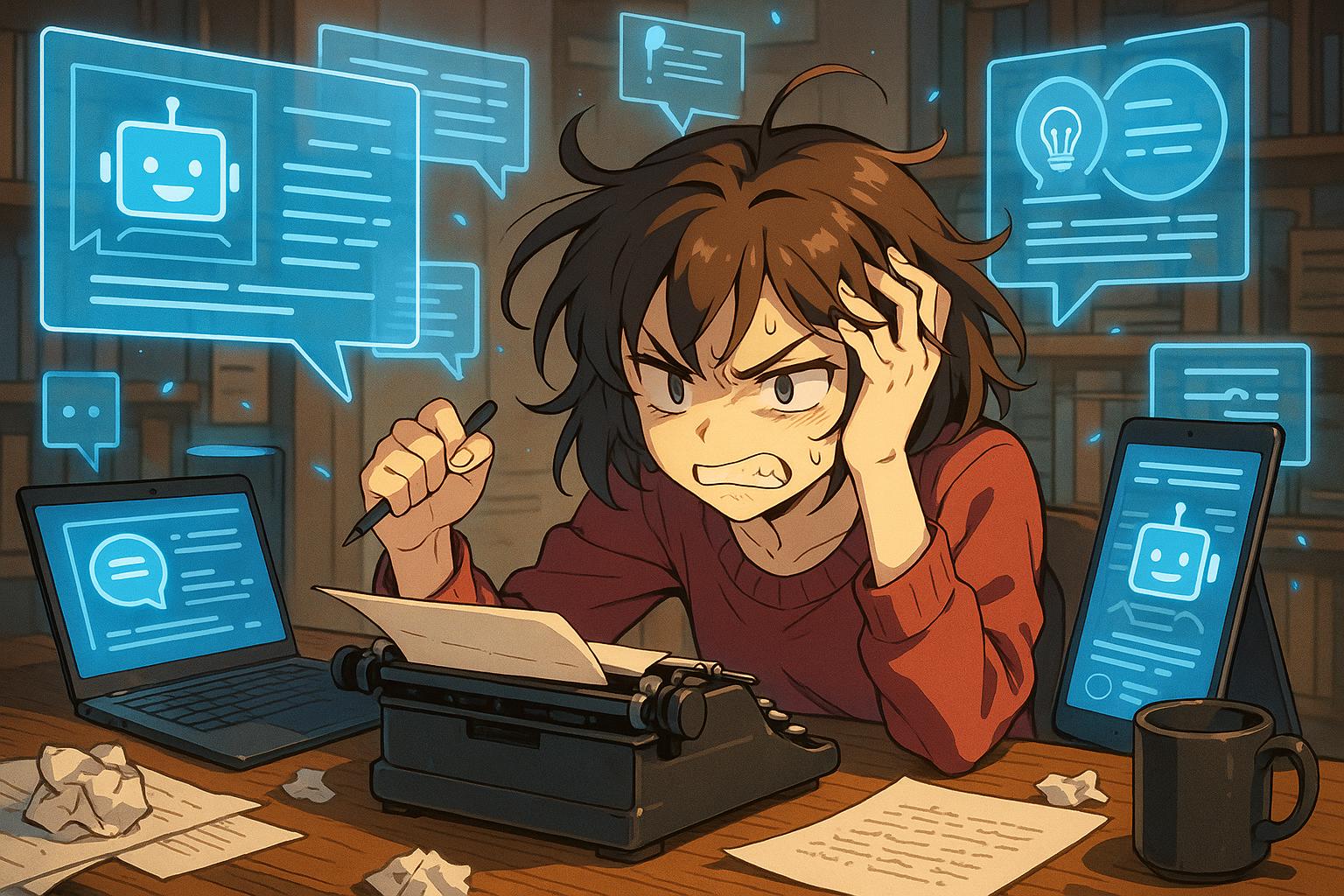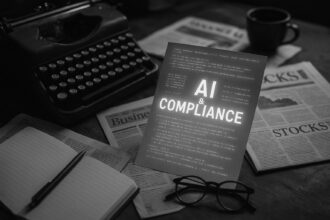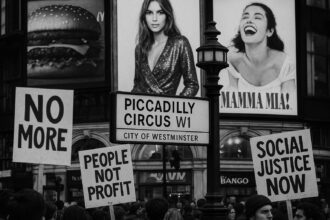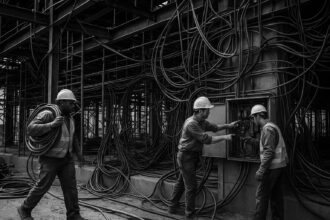As AI tools become more common in writing, authors like Mary Ann reveal a complex mix of frustration and utility, sparking debate over how technology disrupts or enhances the authenticity of storytelling.
The landscape of writing is undergoing a dramatic transformation, largely propelled by advancements in artificial intelligence (AI). While many individuals are becoming conversant with the abbreviation “AI,” the complexities of integrating such technology into creative processes remain a source of frustration, as illustrated by the experiences of both professional authors and aspiring novelists alike.
One such writer, who we’ll refer to as Mary Ann, recently grappled with her writing routine while preparing a new manuscript. Despite her experience—having penned several successful romance novels—she found herself at odds with an AI tool designed to assist her. The software, rather than aiding her flow of ideas, continually interrupted her train of thought, making light work of syntactical corrections while muddling her creative expression. “Stop it!” she exclaimed at her screen, highlighting a growing sentiment among writers that AI may complicate rather than simplify the creative process.
Critics of AI in the literary sphere argue that its integration detracts from the authenticity and emotional depth integral to storytelling. According to a recent article in The Atlantic, some authors contend that reliance on AI undermines the discipline and personal investment typically required in writing. Yet, proponents argue that AI can democratise writing, providing support to those who might otherwise struggle, including individuals with disabilities or those under financial constraints. The reality, however, is nuanced; AI does not replace human creativity but offers a new dimension to the writing experience.
Mary Ann’s frustrations were compounded by the all-too-familiar interruptions from home AI systems like Alexa. These digital aides, while undoubtedly practical, increasingly invade personal spaces during creative brainstorming. Such distractions reflect broader trends noted in interruption science, which reveals that modern workers are diverted from their tasks every few minutes, often taking significant time to refocus. The constant connectivity provided by smart devices has led to an environment where distractions are not merely prevalent but embedded into our workflows.
This phenomenon isn’t limited to individual experience; it also has repercussions at the community level. Over 10,000 authors recently signed an open letter from the Authors Guild advocating for protections against unlicensed AI usage of their work. They highlight a crucial concern: as AI continues to evolve, it may jeopardise the intellectual property rights and, consequently, the livelihoods of many writers.
Conversely, some authors are exploring the potential of AI not as a threat but as a collaborative partner. Writers such as Helen Phillips and Fred Lunzker are weaving AI narratives into their work, reflecting on its societal implications and creative powers. This approach signifies a paradigm shift toward embracing AI’s role in literature, rather than viewing it solely as a hindrance.
The balance between productivity and creative authenticity hinges on understanding AI’s potential downsides. In the realm of academic research, a recent study highlighted that while AI increased the output of scientists, job satisfaction declined alongside creativity and autonomy. Writers may similarly face a future where the allure of efficiency comes at the expense of genuine creative engagement.
Returning to Mary Ann’s journey, as she navigated her chaotic household and her AI assistant’s unsolicited suggestions, she lamented not only missed deadlines but also the essence of her craft. Still, amid her frustrations, she found moments of usefulness: AI offered a quick reference for details—like the name of a picturesque Caribbean island—that might otherwise have consumed her time. This ambivalence showcases a critical point about AI’s role in creativity: it can facilitate productivity but may also dilute the essence of personal storytelling.
As the discourse around AI and writing evolves, it’s clear that each author’s relationship with this technology will be unique. Some will find AI to be a valuable ally, enabling them to reframe their narratives and explore new creative vistas, while others may firmly stand against its encroachment in the literary realm. The challenge lies in navigating this landscape carefully, ensuring that the authentic voice of human creativity remains at the forefront of storytelling.
In a world where AI continues to extend its reach, the question remains: will we tango with its complexities, or will we find ourselves ensnared in a tangle of interruption and mediocrity? The dialogue around this technology is just beginning, and its implications for creativity are as compelling as the narratives we struggle to create.
Reference Map
- Paragraphs 1-3: 1, 2
- Paragraph 4: 3, 4
- Paragraph 5: 6, 7
- Paragraph 6: 5
- Paragraph 7: 4
Source: Noah Wire Services
- https://lakeoswegoreview.com/2025/05/22/jottings-from-fifth-g-tangle-or-tango-with-ai/ – Please view link – unable to able to access data
- https://www.theatlantic.com/books/archive/2024/09/ai-is-coming-for-the-amateur-novelists-thats-fine/679696/?utm_source=apple_news – This article discusses the impact of AI on amateur novelists, highlighting the controversy over AI’s role in writing. Critics argue that AI’s involvement undermines the creativity and challenging nature of novel writing, while proponents believe AI can assist those with less privilege or disabilities. The author suggests that AI can alleviate the pressure of producing numerous low-quality novels quickly, leaving human authors to focus on the thoughtful and creative aspects of writing. Ultimately, writing is a skill developed through patience and effort, and AI’s role in this space remains contentious.
- https://time.com/6337835/ai-mediocrity-essay/ – The essay ‘AI and the Rise of Mediocrity’ discusses the impact of artificial intelligence on creativity and human behavior. Despite AI’s sophisticated ability to generate language and images, it relies fundamentally on the replication of existing human-created content. The author argues that AI can produce average and predictable outputs but lacks genuine creativity and originality. This trend perpetuates mediocrity, as AI-generated content tends to be derivative and unoriginal. The mechanization process, initially designed to improve efficiency, now fosters a culture of low expectations and complacency among consumers, reducing the need for true innovation. Consequently, human creativity and the drive for authentic, original work are at risk as people accept and settle for ‘good enough’ products and services.
- https://apnews.com/article/f846ff75df37dacbdb87b4343a346c2a – Fiction writers are increasingly concerned about the threat of artificial intelligence (AI) to their creative livelihoods, with over 10,000 authors signing an open letter from the Authors Guild urging AI companies not to use copyrighted works without permission or compensation. However, AI also presents new narrative possibilities beyond traditional science fiction. Authors like Helen Phillips and Fred Lunzker are incorporating AI into their upcoming works, reflecting on its societal impacts and creative potential. Other anticipated AI-themed novels include works by Sean Michaels, Bryan Van Dyke, and A.E. Osworth. Some authors, like Stephen Marche and Simon Rich, are even collaborating directly with AI to create literary works. As AI becomes more integral to contemporary culture, it is inspiring new explorations of human relationships, creativity, and identity in fiction.
- https://www.theatlantic.com/podcasts/archive/2025/01/ai-scientific-productivity/681298/?utm_source=apple_news – In this episode of ‘Good on Paper,’ host Jerusalem Demsas delves into the impact of artificial intelligence (AI) on scientific discovery with guest Aidan Toner-Rodgers, an MIT Ph.D. student in economics. Toner-Rodgers recently authored a now-withdrawn working paper on AI integration in a U.S. R&D lab focused on materials science. His research found that the adoption of AI assistants led to striking productivity gains—researchers discovered 44% more materials, filed 39% more patents, and developed 17% more product prototypes. However, the impact was uneven: the highest-performing scientists saw an 81% productivity increase, while the bottom third saw minimal gains. Notably, AI adoption increased the novelty of discoveries and did not compromise quality. Despite these advancements, scientists reported significant declines in job satisfaction, primarily due to the loss of creativity and autonomy as AI took over idea generation. The episode explores broader implications of AI in high-skilled professions, technological progress, and the future of work, cautioning about downstream effects on collaboration, training, and the intrinsic value of scientific labor. It also highlights ongoing concerns about the generalizability of AI’s benefits and potential long-term consequences for innovation.
- https://en.wikipedia.org/wiki/Interruption_science – Interruption science examines the disruptive effects of information technologies such as e-mail, text messages, and phone calls on office workers. Research indicates that the average knowledge worker switches tasks every three minutes, and once distracted, it can take nearly a half-hour to resume the original task. Studies have shown that each employee spends only 11 minutes on any given project before being interrupted. These interruptions can be reduced by introducing roles like a dispatcher and a knowledge base. The field aims to improve the usability and design of devices to minimize disruptions and enhance productivity.
- https://arxiv.org/abs/2403.12004 – This paper explores people’s attitudes toward and experiences with generative AI-powered writing assistants. The study suggests that individuals are willing to forgo financial payments to receive writing assistance from AI, especially if the task is highly creative. Generative AI-powered assistance is found to offer benefits in increasing productivity and confidence in writing. However, direct content generation assistance offered by AI also comes with risks, including decreasing people’s sense of accountability and diversity in writing. The paper discusses the implications of these findings for the future of human-AI co-creation in writing.
Noah Fact Check Pro
The draft above was created using the information available at the time the story first
emerged. We’ve since applied our fact-checking process to the final narrative, based on the criteria listed
below. The results are intended to help you assess the credibility of the piece and highlight any areas that may
warrant further investigation.
Freshness check
Score:
10
Notes:
The narrative was published on May 22, 2025, and does not appear to have been previously reported elsewhere. The Lake Oswego Review is a local publication, and this piece seems to be original content.
Quotes check
Score:
10
Notes:
The direct quotes used in the narrative do not appear in earlier material, indicating originality. The narrative includes a fictionalized account of an author named Mary Ann, which is not corroborated by other sources.
Source reliability
Score:
7
Notes:
The Lake Oswego Review is a local newspaper serving the Lake Oswego, Oregon area. While it provides community-focused news, it may not have the same level of editorial oversight as larger, national outlets. The narrative is presented as a personal account, which may affect its objectivity.
Plausability check
Score:
8
Notes:
The narrative presents a plausible scenario of a writer experiencing frustration with AI tools during the creative process. However, the inclusion of a fictionalized character named Mary Ann raises questions about the authenticity of the account. The narrative does not provide specific details or evidence to support the claims made, which affects its credibility.
Overall assessment
Verdict (FAIL, OPEN, PASS): OPEN
Confidence (LOW, MEDIUM, HIGH): MEDIUM
Summary:
The narrative appears to be original and timely, with no evidence of recycled content or disinformation. However, the use of a fictionalized character and lack of supporting evidence for the claims made raise questions about its credibility. The source, a local newspaper, may not have the same level of editorial oversight as larger outlets, which further affects the reliability of the information presented.













